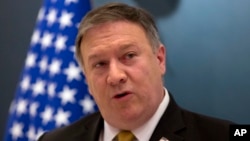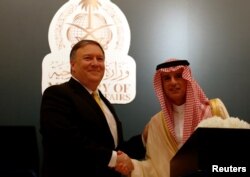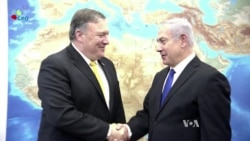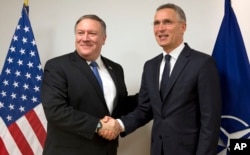U.S. Secretary of State Mike Pompeo made clear Sunday that President Donald Trump plans to abrogate the Iran nuclear deal next month unless it is "fixed" to the U.S. liking.
Pompeo, in the Middle East on his first overseas trip as the top U.S. diplomat, said, "President Trump’s been pretty clear, this deal is very flawed. He’s directed the administration to try and fix it and if we can’t fix it he’s going to withdraw from the deal. It's pretty straightforward."
Speaking in Israel, he said that "unlike the past administration, President Trump has a comprehensive Iran strategy that is designed to counter the full array of threats emanating from Tehran."
En route from Saudi Arabia to Israel, Pompeo told reporters that he had briefed Riyadh's leaders on U.S. talks with European officials on efforts to end Iranian missile tests and combat Tehran's military involvement in Syria, Yemen and elsewhere in the Mideast. He said the U.S. and Saudi Arabia have a "common challenge in Iran," but that "there's still some work to do" in crafting any changes to the 2015 nuclear deal or in creating a new pact.
For its part, Iran has said it has no intention of altering the deal it agreed to with Germany, France, Britain, China, Russia and the U.S. in any way or agreeing to a new nuclear pact.
Trump faces a May 12 deadline whether to reimpose economic sanctions against Iran, pulling the U.S. out of the deal agreed to by former U.S. President Barack Obama. Trump stands alone among the six signatories to the accord in threatening to abrogate it.
In Tel Aviv, Pompeo, after meeting with Israel Prime Minister Benjamin Netanyahu, said the U.S. remains "deeply concerned about Iran's dangerous escalation of threats towards Israel and the region."
Earlier, in Riyadh, the new secretary of state said, "Iran destabilizes this entire region. It supports proxy militias and terrorist groups. It is an arms dealer to the Houthi rebels in Yemen. It supports the murderous Assad regime [in Syria] as well."
Pompeo stressed the need for unity among Persian Gulf allies of the U.S. to show support for new sanctions against Iran unless new restrictions are imposed on Iran's nuclear program.
WATCH: Pompeo Middle East visit
In Saudi Arabia, a senior policy adviser to Pompeo who is accompanying the secretary of state, called on European allies and other countries to impose sanctions on Iran to weaken its missile program.
"We are urging nations around the world to sanction any individuals and entities associated with Iran's missile program, and it has also been a big part of discussions with Europeans," the adviser told reporters in Riyadh.
The three-day trip also includes a stop in Jordan.
In Brussels on Friday, Pompeo said he had discussed the nuclear deal with his NATO counterparts.
Pompeo is said to be more "hawkish" on the Iranian government than his predecessor, Rex Tillerson, who wanted the U.S. to stay in the Iran nuclear agreement.
Tillerson was abruptly fired by Trump last month, just hours after returning from a trip to Africa. Trump said he and Pompeo are much more "on the same wavelength" on Iran and other issues.









